- Strengthening the International Competitiveness of Japanese Agriculture -
GREENCOLLAR Begins Developing Table Grape Varieties with Sights Set on a Royalty Business
Vertically Integrated Business Model, from Variety Development to Production and Sales
September 2, 2021
Mitsui Fudosan Co., Ltd.
GREENCOLLAR Inc.
GREENCOLLAR NEWZEALAND LIMITED
GREENCOLLAR Inc. recently announced that it will enter the field of table grape breeding with a view to establishing a breeding royalty business in collaboration with Hayashi Grape Labo. The development of exceptional grape varieties is a source of agricultural competitiveness, but patent applications for new plant varieties have been decreasing in Japan, and there are concerns about a decline in the country’s international competitiveness in the future.
Through this new partnership, the company will develop grape varieties and also protect the rights of breeders and create a system for returning profits to them. In doing so, the company intends to transform the breeding business into a highly appealing industry and further raise Japan’s international competitiveness.
GREENCOLLAR has already acquired its first lot in New Zealand and begun full-fledged production. A development center will be established at the farm with Hayashi Grape Labo. to jointly develop new grape varieties and cultivate the Muscat Zipang variety the lab previously succeeded in developing.
By becoming involved in the breeding sector, GREENCOLLAR is creating a business system that vertically integrates processes from variety development to production and sales. It also plans to leverage twice yearly production and sales results in variety development and improvement activities in order to make it possible to provide varieties that match the production region’s environment and suit the diversifying preferences of consumers.
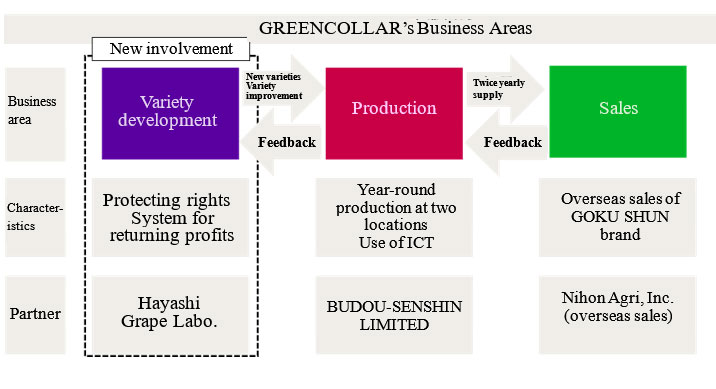
[TOPIC 1]
Beginning Variety Development with Hayashi Grape Labo. with a View to Breeding Royalty Business
< Current State of Plant Breeding >
Exceptional new varieties are a source of competitiveness for agriculture, but patent applications for new plant varieties in Japan have been decreasing every year, and in 2017 there were significantly more applications filed in China, the EU, and the US. Fruit applications in particular are a low percentage of the total in Japan, and there are concerns about a future decline in the country’s international competitiveness.
Plant Variety Patent Applications by Country
| 2007 | 2017 | Change (times) |
|
|---|---|---|---|
| Japan | 1,016 | 570 | 0.6 |
| China | 811 | 5,222 | 6.4 |
| EU | 2,316 | 2,831 | 1.2 |
| US | 708 | 900 | 1.3 |
| South Korea | 380 | 591 | 1.6 |
Patent Applications in Japan by Crop (1978-2018, cumulative)
| Type | Number | Percentage |
|---|---|---|
| Flowers and ornamental plants | 21,478 | 78% |
| Food crops | 1,447 | 5% |
| Vegetables | 1,846 | 7% |
| Fruits | 1,430 | 5% |
| Other | 1,195 | 4% |
Source: Excerpted and edited from “Current State of Plant Variety Protection in Japan and Overseas (2019),” Food Industry Affairs Bureau, Ministry of Agriculture, Forestry and Fisheries
> Comment from Hayashi Grape Labo. President Shingo Hayashi <
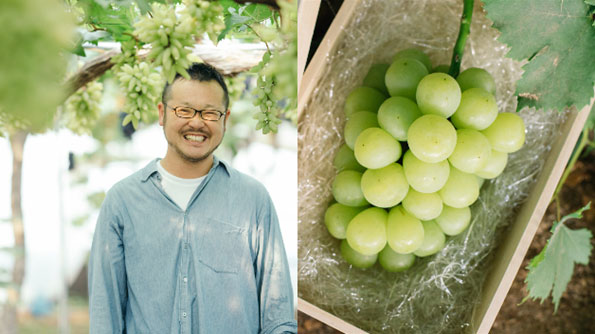
*Photo right: Muscat Zipang developed by Mr. Hayashi
On the frontlines of agriculture in recent years, varieties are becoming more and more important due to increased cultivation-related risk caused by climate change and diversification in consumer preferences.
However, recognition of plant varieties as intellectual property had been slow in Japan, and individual breeders like me faced the major challenge of how to recover the cost of variety development.
Having now begun joint development with GREENCOLLAR in New Zealand, which has a system of variety protection rights in place, we will be able to accelerate development, and by entering the royalty business, we will be able to establish a sustainable environment for development. In the future, we hope to make the development platform a more open one and thereby give back to Japan’s breeders and farmers.
< Solving Issues Through Involvement in Plant Breeding >
Under its new strategy for agricultural intellectual property, the Japanese government amended the Plant Variety Protection and Seed Act in 2020 and established a legal system for the protection of breeders’ rights. GREENCOLLAR sees this as helping to solve society-wide issues related to plant breeding, strengthen the international competitiveness of Japanese agriculture, and also create new business opportunities. The company has therefore joined with Hayashi Grape Labo. to enter the field of plant breeding. GREENCOLLAR intends not only to develop new varieties but also protect breeder rights through licensing and build a system for returning profits to them. In the future, it will operate a plant variety royalty business—something not yet established in Japan—and transform the breeding business into a highly appealing industry. This will then further strengthen the international competitiveness of Japanese agriculture.
Protecting Breeder Rights and System for Returning Profits to Them
【TOPIC 2】
GREENCOLLAR Acquires First Lot in New Zealand
GREENCOLLAR’s First Lot in New Zealand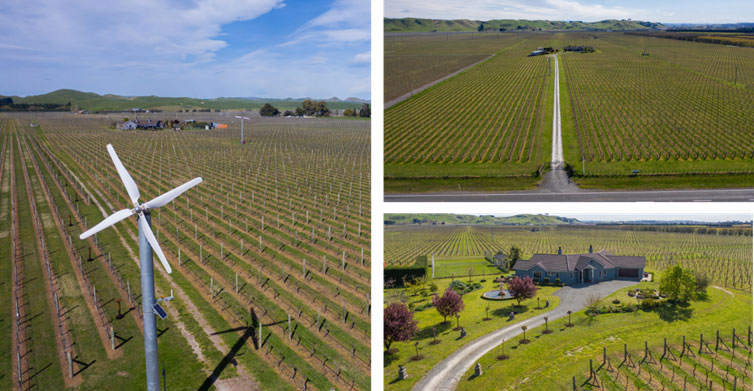
< Production Commenced at the First Lot in New Zealand >
In April 2020, GREENCOLLAR acquired its first lot for production in the Hawke’s Bay district in New Zealand (9.4 hectares with a production area of around 8 hectares). After the New Zealand government’s review process for land acquisition was completed, ownership was transferred, and Japanese-style grapevine trellises are now being built. Around 800 Violet King saplings that are temporarily planted in a field owned by BUDOU-SENSHIN LIMITED, our production partner, will be transplanted in the lot, and Muscat Zipang, Kyoho and other varieties will be planted as well. The company expects the first harvest in March 2024.
< Year-Round Production, Year-Round Employment>
In grape farming, there is a major difference in the workload between peak and off-seasons, so it is difficult to employ large numbers of people all year round. This has been a major hurdle to increasing scale, increasing efficiency, and creating higher added value.
Producing twice a year, once in the northern hemisphere and once in the southern hemisphere, makes it possible to provide employment throughout the year, raise productivity, and increase technical capacities. It also makes it possible to supply grapes to the entire world, even during times table grapes were not available in the northern hemisphere, and this increases added value and bolsters profits.
GREENCOLLAR not only has its own employees, but also hires Japanese farmers who want to work in New Zealand during Japan’s off-season, a system that provides year-round employment for farmers.
GREENCOLLAR’s Business Activities and Grape Production Schedule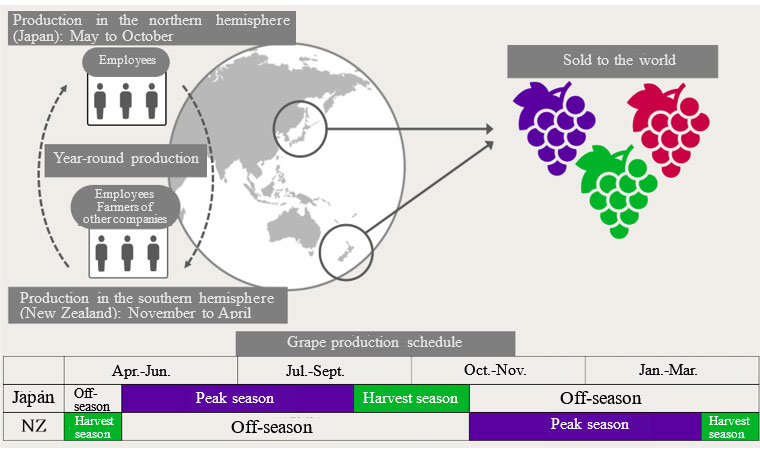
< Comment from GREENCOLLAR NEW ZEALAND LIMITED Managing Director Shin Koizumi >
The first lot in New Zealand is one of the world’s largest grape production sites that employs Japanese-style grapevine trellises.
Combining Japan’s outstanding table grape production and breeding techniques with New Zealand’s progressive farming methods will not only be profitable economically for both countries but also, through the project, support local communities and contribute to regional development while playing a role in bridging the cultures of the two countries.
■About GREENCOLLAR
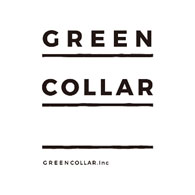
At a time when the entire world is beginning to transition from mass production, mass consumption, and information saturation, GREENCOLLAR, with a vision of “Living with nature,” is drawing on mind, body and sensibility in the midst of mother nature to carefully grow GOKU SHUN grapes one by one while shuttling back and forth between the northern and southern hemispheres.
GREENCOLLAR pursues wellbeing through agriculture by creating new forms of farming and enhancing the appeal of agriculture as a profession.
■About GOKU SHUN
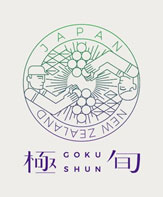
Grown in both the northern and southern hemispheres, GOKU SHUN is never out of season.
“Shun” means “in-season,” and its Japanese character is written as if the “day” or the “sun” is being “wrapped” or “embraced.”
GOKU SHUN is a craft brand of Japanese grape grown in both hemispheres. It is never out of season, bathed in plenty of sunlight and packed with deliciousness.
GOKU SHUN Online Store | https://gokushun.com/ (Japanese)
GOKU SHUN on Instagram | https://www.instagram.com/goku.shun/
■ Company overview
GREENCOLLAR, Inc.
| Location | 3-2-1, Nihonbashi Muromachi, Chuo-ku, Tokyo |
|---|---|
| Establishment date | December 25, 2019 |
| Representative Directors | Osamu Oba, Yusuke Kaburagi, Shin Koizumi |
| Website | https://greencollar.co.jp/en/ |
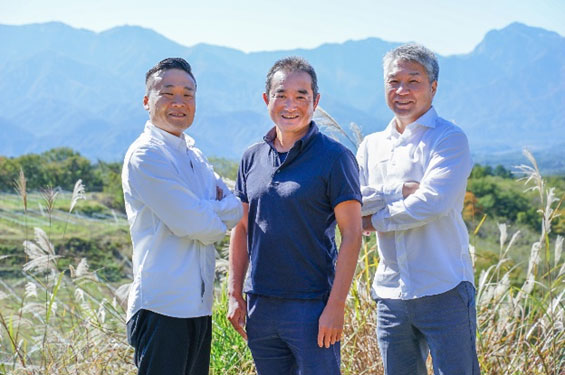
GREENCOLLAR NEWZEALAND LIMITED
*Wholly owned subsidiary of GREENCOLLAR
| Location | 45 Queen Street, Auckland 1010, New Zealand |
|---|---|
| Establishment date | January 31, 2020 |
| Representative Director | Shin Koizumi |
| Directors | Osamu Oba, Yusuke Kaburagi, Tracy Hickman |
| Executive Advise | KIRWAN, John James Patrick |
■ About Hayashi Grape Labo.
Hayashi Grape Labo. was established by Shingo Hayashi, a fourth-generation farmer whose family farm, Hayashi Nouen, has been in operation for over 100 years. Located in Tsudaka, Kita-ku, Okayama City, the birthplace of Muscat of Alexandria, the lab cultivates and manages over 100 varieties of grapes. Though the odds are said to be one in ten thousand, from around 2003 the lab worked to develop a new variety of grape, one particularly suited to Okayama’s climate, and after ten years of effort succeeded in creating Muscat Zipang.
■ The Mitsui Fudosan Group’s business proposal system, MAG!C
This system was created during fiscal 2018 to reboot the Mitsui Fudosan Group’s DNA of Innovation and for the Companywide promotion to innovate the real estate business.
In principle, those who propose a business are given responsibility for it to move ahead.




























